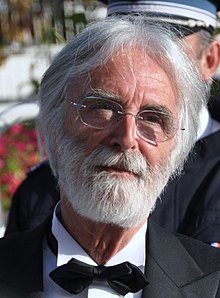Michael Haneke | |
|---|---|
 Haneke in 2009 | |
| Born | 23 March 1942 Munich, Germany |
| Nationality | Austrian |
| Alma mater | University of Vienna |
| Occupation(s) | Film director, screenwriter |
| Years active | 1974–present |
| Spouse |
Susanne Haneke (m. 1983) |
| Children | 1 |
Michael Haneke (German: [ˈhaːnəkə]; born 23 March 1942) is an Austrian film director and screenwriter. His work often examines social issues and depicts the feelings of estrangement experienced by individuals in modern society.[1] Haneke has made films in French, German, and English and has worked in television and theatre. He also teaches film direction at the Film Academy Vienna.
Haneke's first films were his "glaciation" trilogy, consisting of The Seventh Continent (1989), Benny's Video (1992), and 71 Fragments of a Chronology of Chance (1994), each of which depict a "coldly bureaucratic society in which genuine human relationships have been supplanted by a deep-seated collective malaise" and explore "the relationship among consumerism, violence, mass media, and contemporary alienation".[2] He went on to win the Cannes Film Festival's Grand Prix for The Piano Teacher (2001) as well as its Palme d'Or twice, for The White Ribbon (2009) and Amour (2012), the latter of which received five Academy Award nominations and won the Academy Award for Best Foreign Language Film. He also directed Funny Games (1997) and its 2007 remake, Code Unknown (2000), Time of the Wolf (2003), Caché (2005), and Happy End (2017).
- ^ Wray, John (23 September 2007). "Minister of Fear". The New York Times Magazine. Retrieved 21 August 2007.
- ^ "Michael Haneke: Trilogy". The Criterion Collection. Retrieved 3 July 2023.